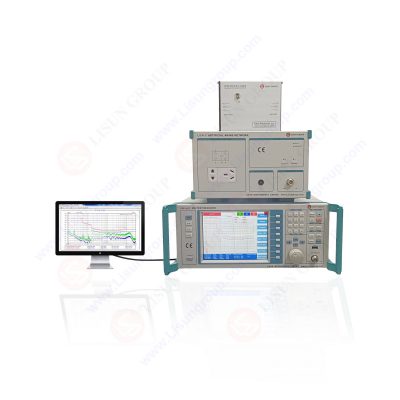With the development of science and technology, more and more digitized, high-speed electrical and electronic equipment is widely used in various fields of society, while promoting social development, the electromagnetic interference generated by the application of electrical and electronic equipment also brings electromagnetic pollution problems to society. While electromagnetic pollution and water pollution, air pollution is known as the three major sources of pollution in today’s society. With the increasing prominence of the problem of electromagnetic interference, the European Standards Committee has issued standards such as EN55015 and EN55022. These measures and standards are designed to regulate electromagnetic interference limits and other specifications for point electronic products (including LED and small household appliances) to reduce the social problems caused by electromagnetic interference.
EMC testing is well known, including EMI and EMS two parts. EMC is test targets are electrical and electronic equipment (which includes LED and small household appliances), and lighting as an important part of it, naturally has corresponding constraints. Such as the FCC certification in the United States, the CE certification in the European Union, etc. have proposed relevant test items for LED lighting equipment. Mandatory from January 1, 1996, the EMI (electromagnetic radiation) test standard for LED must comply with: EN55015, EN55022, EN61000-3-2/-3.
In the EN55015 standard, the radiated electromagnetic interference method is what we usually call the EMI electromagnetic interference test There are two ways to interfere below:
Conducted interference refers to the coupling (interference) of signals on one electrical network to another electrical network through a conductive medium.
Radiated interference is when an interference source couples (interferes) its signal to another electrical network through space. In high-speed PCB and system design, high-frequency signal lines, integrated circuit pins, various connectors, etc. may become radiated interference sources with antenna characteristics, which can emit electromagnetic waves and affect the normal operation of other systems or other subsystems in the system.
EMI test definition: The intensity of radiation interference generated by the TEST EUT is divided into RE (radiation, emission) test and (CE (conducted interference) test.
1. RE test is to measure the radiated interference generated by EUT, its test frequency range: 30MHZ ~ 1GHZ; The testing site should be open and the test distance should be 10 meters; Test method: Measure electromagnetic wave radiation generated by EUT (30MHZ~1GHZ)
2. CE test measures the conducted radiation interference generated by EUT, and its test frequency range: 150K~30MHZ; Test method: refer to the relevant test standard EN55022 or other test standards; One of the test methods is: measuring electromagnetic wave noise appears on the DA and AC movie end of EUT (150K~30MHZ); The other is to measure the radiated interference value (150K~30MHZ) at the end of the telecom port.
For EMI testing, EU countries, the EN55015 standard (citing CISPR-15) is suitable for traditional lighting equipment with luminaire frequencies exceeding 100Hz, such as incandescent lamps, fluorescent lamps, self-rectifier energy-saving lamps, etc. In the lighting industry, there are two methods for testing EMI in the 9KHz-30MHz band, one is to use Antenna and EMI receiver; The other is the LISN test method, which needs to be carried out by EMI receiver + artificial power network + LISN and test software.
EMI testing for household appliances and small household appliances includes on the one hand, RE (radiation, emission) and CE (conducted interference) testing; On the other hand, Harmonic and Flicker tests.
Finally, LISUN GROUP launched the hot-selling EMI conducted radiation interference test system

EMI receiver system for EMI radiation conduction or conducted emissions testing. The EMI-9KB EMI receiver is produced by the full closure structure and strong electro-conductibility material, which has high shielding effect. Due to the new technology for the EMI Test System, it solved the instrument self-EMI problem. The test results are according to the international format test report. The EMI Test System EMI-9KB fully meets CISPR15:2018, CISPR16-1, GB17743, FCC, EN55015 and EN55022.System
Configurations:
• EMI-9KC Test System includes: EMI-9KC EMI Receiver built-in Attenuator (9K-1GHz), LISN-A Artificial Network Power (16A with RS-232 communicate), CDNE-M316 Coupling/Decoupling Network for Emission, 3pcs Isolation Transformers and cables.
• EMI-9KB Test System includes: EMI-9KB EMI Receiver (9K-300MHz), LISN-A Artificial Network Power (5A), CDNE-M316 Coupling/Decoupling Network for Emission, 3pcs Isolation Transformers, Attenuator and cables.
• EMI-9KA Test System includes: EMI-9KA EMI Receiver (9K-30MHz), LISN-A Artificial Network Power (5A), 3pcs Isolation Transformers, Attenuator and cables.

EMI Test Receiver
Lisun Instruments Limited was found by LISUN GROUP in 2003. LISUN quality system has been strictly certified by ISO9001:2015. As a CIE Membership, LISUN products are designed based on CIE, IEC and other international or national standards. All products passed CE certificate and authenticated by the third party lab.
Our main products are Goniophotometer, Integrating Sphere, Spectroradiometer, Surge Generator, ESD Simulator Guns, EMI Receiver, EMC Test Equipment, Electrical Safety Tester, Environmental Chamber, Temperature Chamber, Climate Chamber, Thermal Chamber, Salt Spray Test, Dust Test Chamber, Waterproof Test, RoHS Test (EDXRF), Glow Wire Test and Needle Flame Test.
Please feel free to contact us if you need any support.
Tech Dep: Service@Lisungroup.com, Cell/WhatsApp:+8615317907381
Sales Dep: Sales@Lisungroup.com, Cell/WhatsApp:+8618117273997
Your email address will not be published. Required fields are marked *